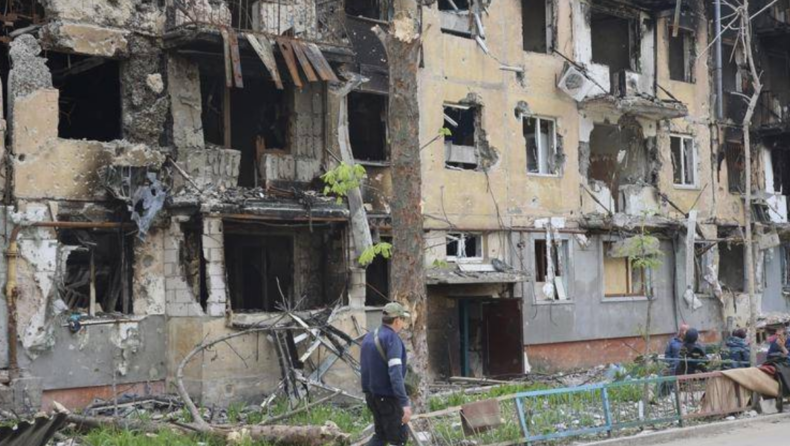Russia’s oil imports will be banned by the end of the year, as well as additional banking sanctions against the Russian government and the cutting off of some Russian broadcasters in Europe, according to the European Union(EU), which claims that the Kremlin will pay a high price for its aggression against Ukraine.
Due to Russia’s intensification of its attacks in eastern Ukraine on May 4, the EU announced that its sixth round of sanctions against Moscow will include a phase-out of Russian crude and refined oil products by the end of this year, despite opposition from some of the bloc’s members, including Slovakia and Hungary.
European Commission President Ursula von der Leyen told the European Parliament in Strasbourg that “we will phase out Russian crude oil supply within six months” and “refined products” by the end of the year. Von der Leyen is the leader of the EU’s executive European Commission.
In her statement, she stated that “[Russian President Vladimir] Putin must pay a terrible price for his barbaric actions” by imposing a comprehensive import ban on all Russian oil, including seaborne and pipeline cargoes, crude and refined products.
Von der Leyen, on the other hand, acknowledged that achieving consensus on oil sanctions “would not be simple.” The chairman of the panel, on the other hand, acknowledged that achieving unanimity on oil sanctions “would not be simple.”

The measures must be approved by all 27 member states of the European Union before they can be implemented, and shortly after von der Leyen’s announcement, Hungary, Slovakia, and Bulgaria announced that they would seek exemptions from the embargo, citing concerns about the security of their energy supplies. Hungary and Slovakia are significantly reliant on Russian energy supplies for their energy needs.
A temporary exemption period of two or three years would be sought by the Czech Republic in order for pipeline capacity to be increased, according to the country’s government.Sberbank, Russia’s largest bank, as well as two other important financial institutions, according to Von der Leyen, should be severed from the SWIFT international banking payment system, as well.
She also stated that the EU will impose a ban on three Russian state-owned broadcasters, without mentioning the channels specifically.
From now on, they will not be permitted to distribute their content in the European Union in any shape or form, whether it’s by cable or satellite, the internet or mobile phone applications,” von der Leyen told EU legislators.
According to a document obtained by RFE/RL, the package also contains a list of 58 individuals who have been sanctioned as a result of Russia’s military involvement in Ukraine, which includes the Patriarch of the Russian Orthodox Church, who is a close ally of Putin.
Von der Leyen also recommended developing a recovery package for Ukraine in order to assist the country in its post-war reconstruction.
The package, according to von der Leyen, “should bring enormous investment to address the needs while also bringing about the required reforms.” It will eventually pave the way for Ukraine’s future integration into the European Union, according to the statement.
Almost one-half of Russia’s crude and refined oil products are sent to the European Union. However, in its initial response to Brussels’ statement, the Kremlin put on a brave front, warning that the embargo is a “double-edged sword” and that EU consumers will bear the brunt of the consequences.
As Russian presidential spokesman Dmitry Peskov stated on May 4, “the burden of these sanctions to the population of Europe will rise by the day.”
Peskov stated that the Kremlin was considering “a number of different measures” for responding to the new penalties.
Russia has deployed 22 battalions near Izyum, a city in eastern Ukraine, in a bid to push into the Donbas region, according to the British Defense Ministry’s daily bulletin on May 4. Russia’s apparent goal, according to the British Defense Ministry, is to capture the eastern cities of Kramatorsk and Severodonetsk, “despite struggling to break through Ukrainian defenses.” A Russian battalion is typically comprised of 700-800 soldiers, depending on the situation.
Capturing the two cities, according to the British intelligence report, would “consolidate Russian military dominance” over the region’s northeastern Ukrainian regions.
According to the Ukrainian Defense Ministry, on May 4, the armed forces of neighbouring Belarus launched “surprise” large-scale manoeuvres to assess their combat readiness in order to improve their battle readiness.
It has been reported that Russian troops shelled a coke plant in the city of Avdiyivka, killing at least ten people and wounded another fifteen, according to the governor of Ukraine’s Donetsk region. According to Pavlo Kyrylenko, 11 more persons were murdered as a result of the shelling of four towns in the area.
A Russian airstrike on a train station in Kramatorsk last month resulted in the deaths of 56 people and the injuries of 109 others, according to Kyrylenko, making May 3 the deadliest single day since that attack. On April 8, a Russian missile struck the train station, killing 57 people and injuring 109 others.
As recently as May 4, Russian Foreign Minister Dmitry Peskov refuted Ukrainian claims that Russian troops had assaulted the Avozstal steel mill just after the latest batch of residents managed to flee the enormous industrial complex.
In response to assertions made by Ukrainian military stationed inside the steelworks, Peskov told reporters, “There has been no storming.”
In a statement released on April 21, Russian President Vladimir Putin claimed that a direct assault on Azovstal would result in too many Russian casualties. Peskov was alluding to Putin’s statement, which stated that a frontal assault on Azovstal would result in too many Russian casualties. As an alternative, Putin suggested that military should block up Azovstal so securely that “not even a fly can get out.”
Published By – Supreeti Ghosh













